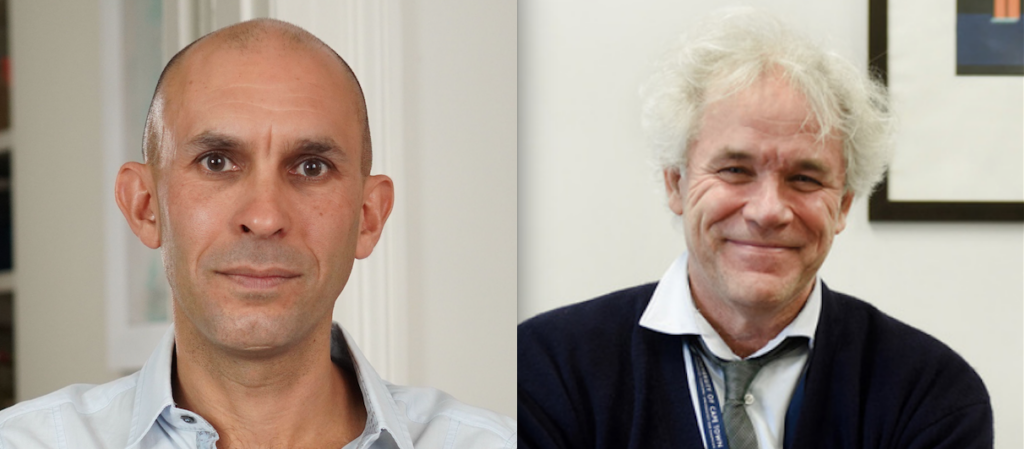Anil Seth – Mark Solms Dialogue
Speaking about the brain and consciousness
in dialogue with
Following the recent publication of their respective books on the brain and consciousness, this meeting offers a dialogue between these two eminent neuroscientists and thinkers in order to explore some points of contact, as well as some differences in their perspectives on the subject.
Friday, December 10
10:30 a.m. (Eastern Standard Time)
Please click here to view the video of this event.
Start time in selected time zones
The webinar will be 2 hours long.
Anil Seth
Consciousness is, for each of us, all there is. Without consciousness there is no world, no self: there is nothing at all. But we know surprisingly little about the material and biological basis of this most central feature of our lives. How do rich multisensory experiences, the senses of self and body, and volition, agency, and ‘will’ emerge from the joint activity of billions of neurons locked inside a bony skull? Once the province of philosophy and theology, understanding consciousness has re-emerged as a major scientific challenge for this century. In this talk I will give a fresh perspective on this new science of consciousness, drawing from my new book Being You. We will see that the brain is a kind of prediction machine, that experiences of the world – and of the self – are forms of ‘controlled hallucination’, and that consciousness is deeply rooted in our nature as living creatures, embodied and embedded in our environments.
Being You – A New Science of Consciousness
Please click here to access Professor Seth’s book.
Mark Solms
I will begin by reviewing the ‘hard problem’ of consciousness. Then I will summarize clinico-anatomical and physiological evidence for the views (1) that consciousness is generated primarily in the brainstem and only secondarily in the cortex, and (2) that the form of consciousness which is generated in the brainstem is not lacking in content or quality, as is widely claimed. Furthermore, regarding (1) I will argue that the cortex can perform almost all of its information-processing tasks unconsciously — which raises the question as to why it ever processes information consciously — and regarding (2) I will argue that the brainstem form of consciousness is fundamentally affective in nature. This will lead me to the conclusion that affective consciousness is the fundamental form of consciousness and that it is prerequisite for all other forms, such as conscious perception and cognition. Against this empirical background, I will revisit the philosophical hard problem. Finally, I will consider afresh the biological function of affective consciousness and I will offer some hypotheses concerning the nature of the relationship between this (brainstem) form of consciousness and the cortical form.
The Hidden Spring: A Journey to the Source of Consciousness
Please click here to access Professor Solms’ book.
Bios
Anil Seth is Professor of Cognitive and Computational Neuroscience at the University of Sussex, Co-Director of the Canadian Institute for Advanced Research (CIFAR) Program on Brain, Mind and Consciousness, an ERC Advanced Investigator, Editor-in-Chief of the journal Neuroscience of Consciousness and a Wellcome Trust Engagement Fellow. He holds degrees in Natural Sciences (MA, Cambridge, 1996), Knowledge-Based Systems (MSc, Sussex, 1996), and Computer Science and Artificial Intelligence (Ph.D., Sussex, 2001). He has published more than 180 papers and is listed in the Web of Science ‘Highly Cited Researcher’ index (2019, 2020, 2021). His 2017 TED talk has been viewed more than twelve million times, and his new book Being You: A New Science of Consciousness was an instant Sunday Times top 10 bestseller, a Guardian book of the week, and a Financial Times best science book of the year. Find out more: www.anilseth.com, @anilkseth
Mark Solms is the Co-Chair (with Cristina Alberini) of the International Neuropsychoanalysis Society. He is also Research Chair of the IPA and Science Director of APsaA. He coined the word ‘neuro-psychoanalysis’ in 1998, and has been a major contributor to the development of this field. He is a Full Professor and the Director of Neuropsychology at the Neuroscience Institute of the University of Cape Town, South Africa.
CPD credits: 2
(Please click here for further information regarding CPD credits.)
